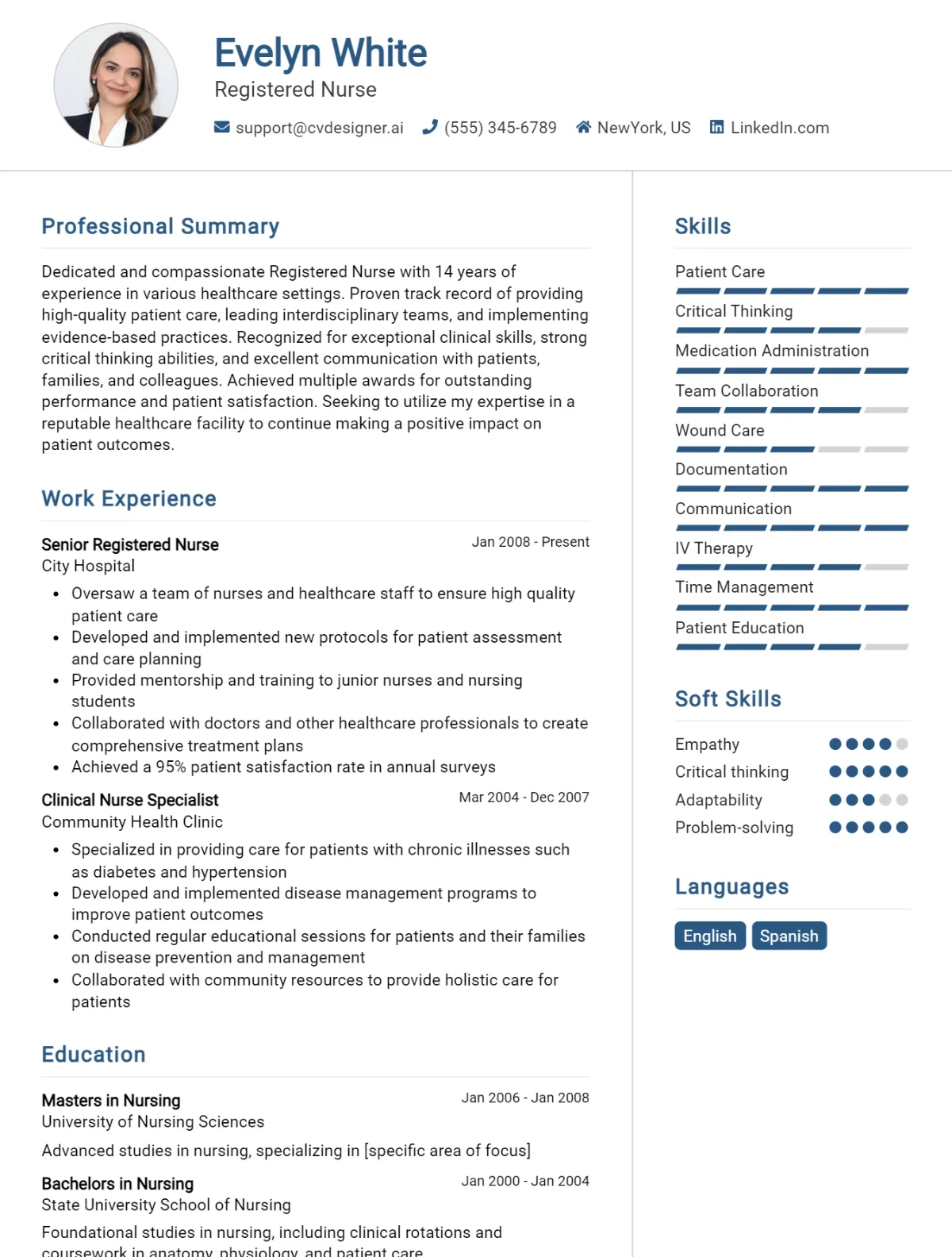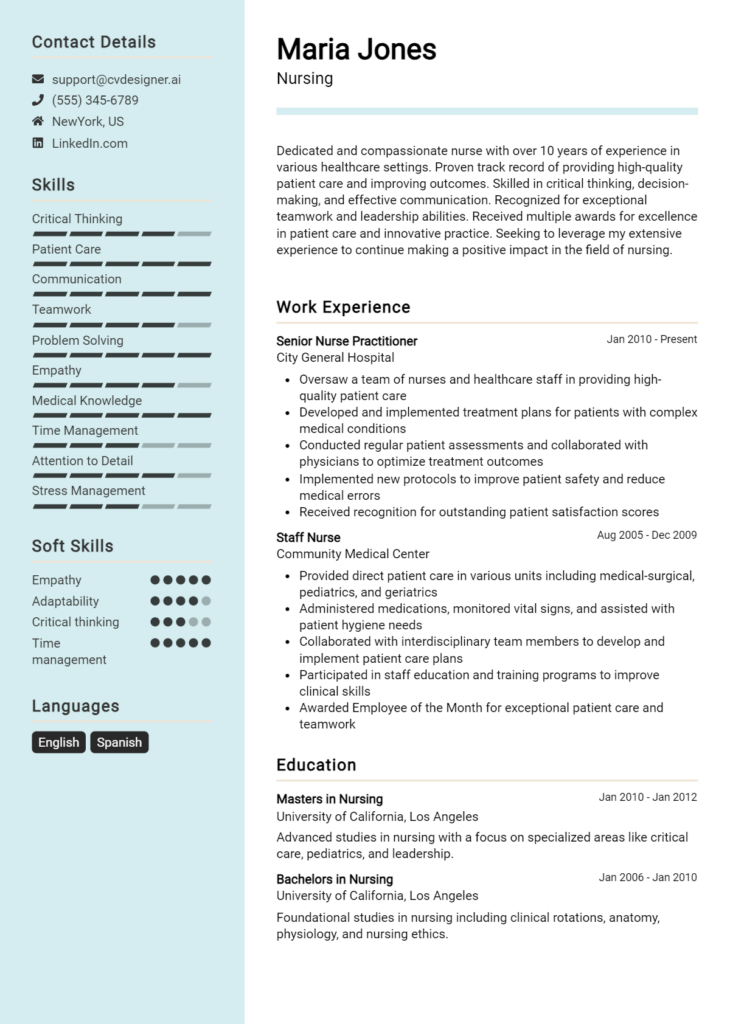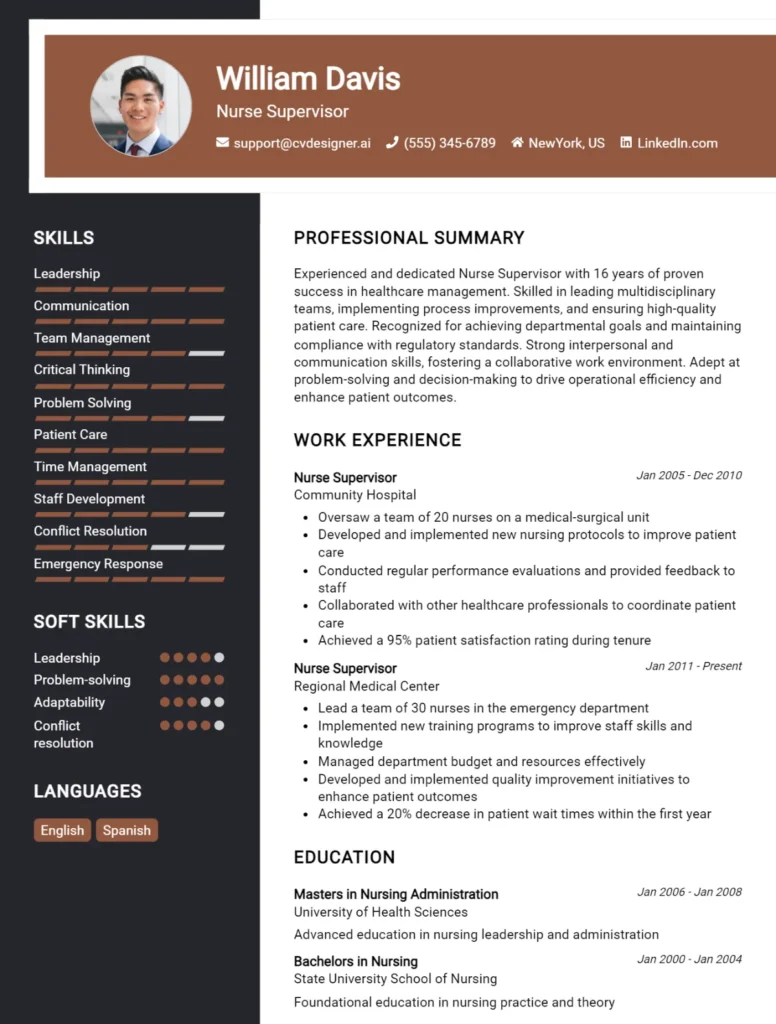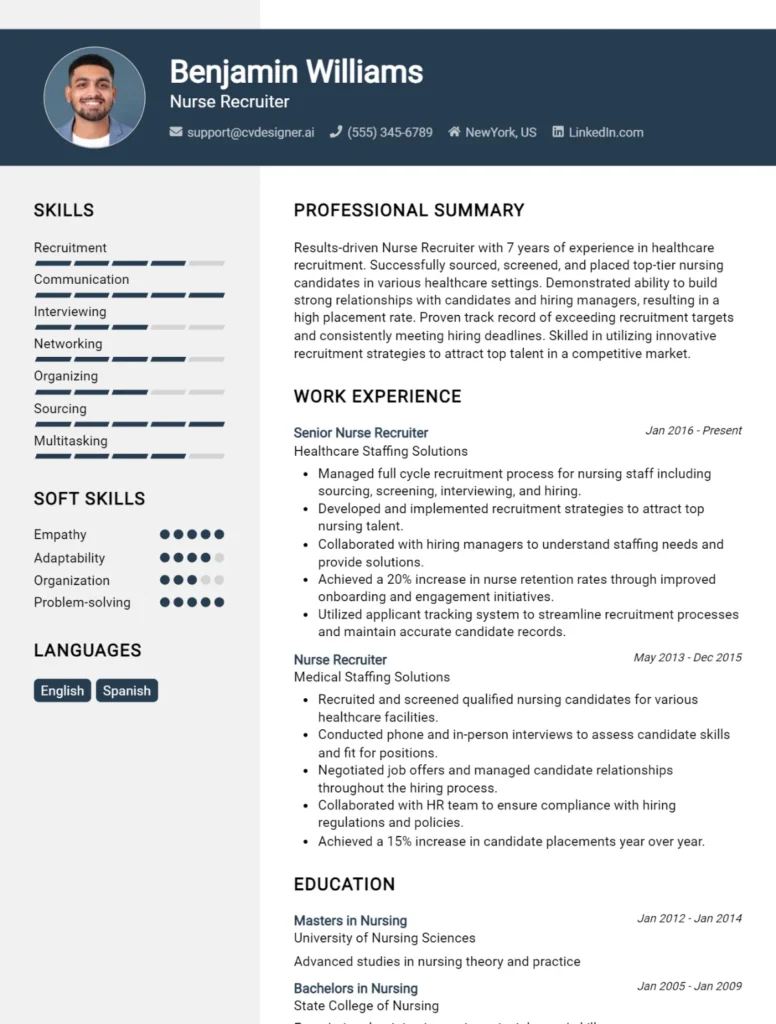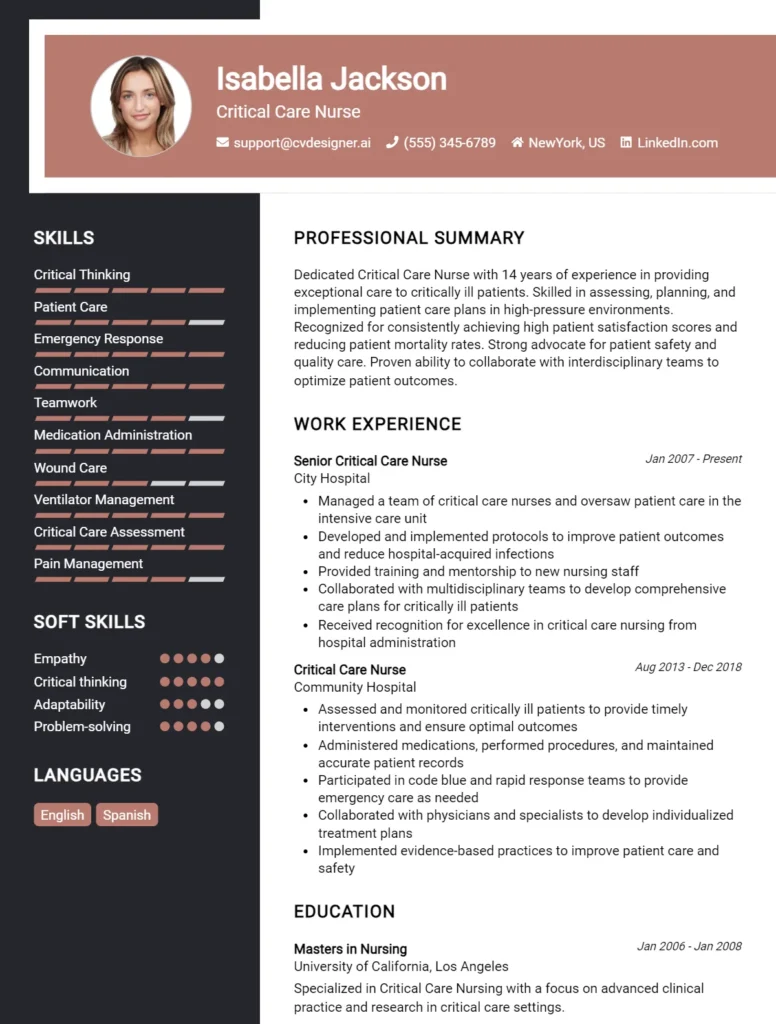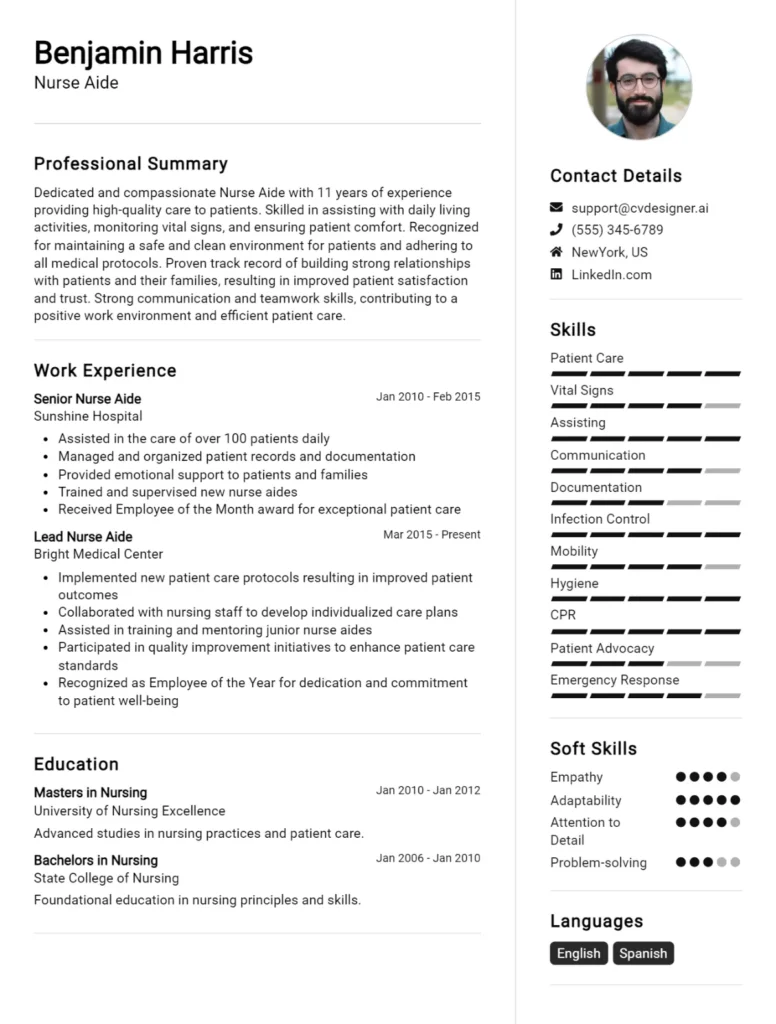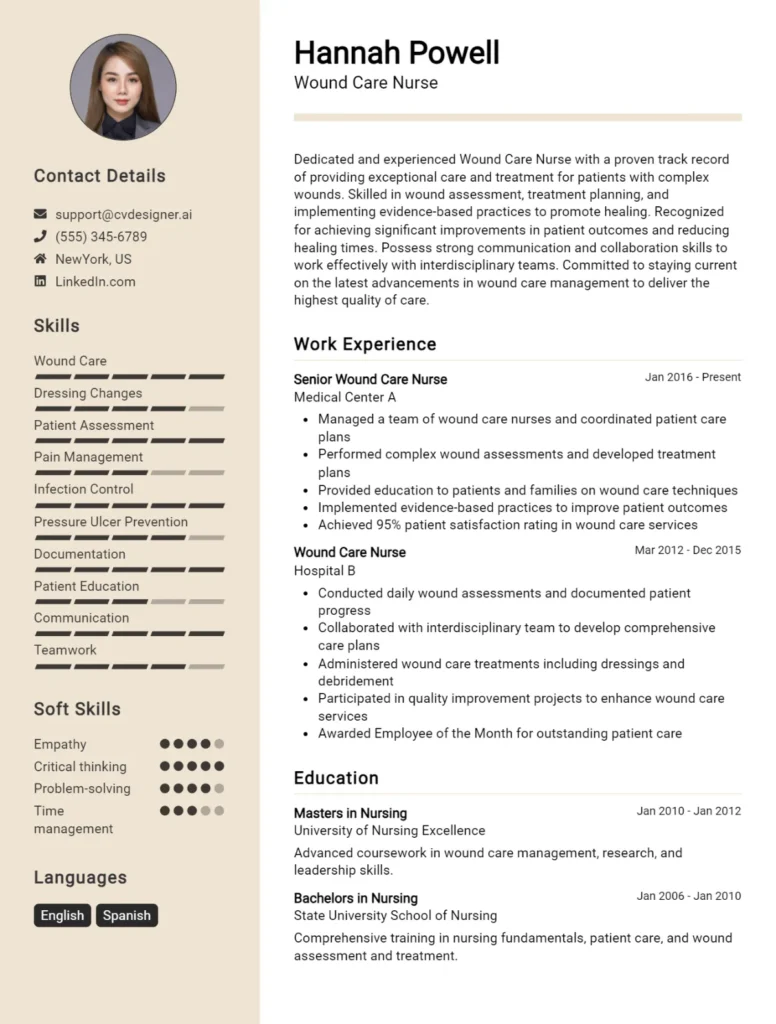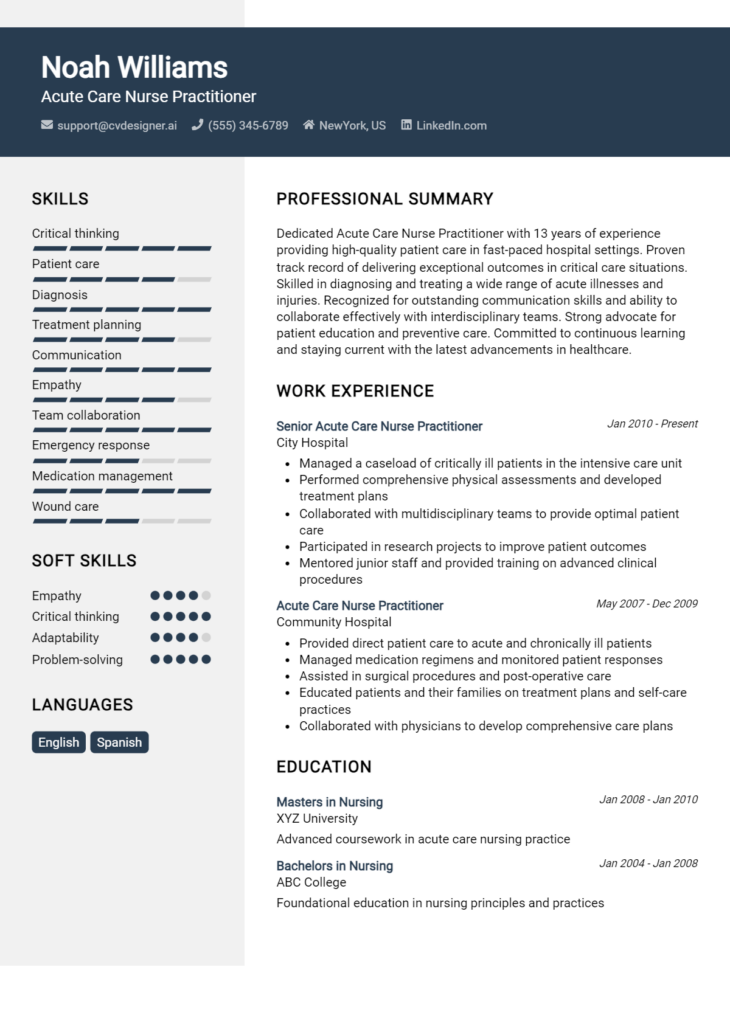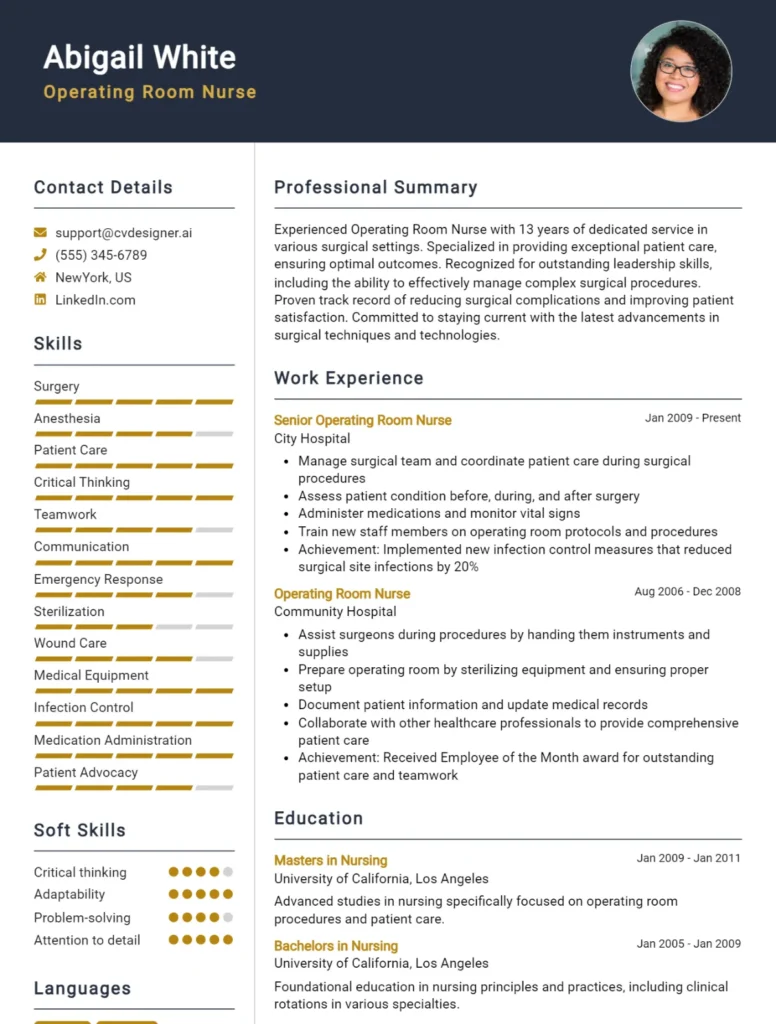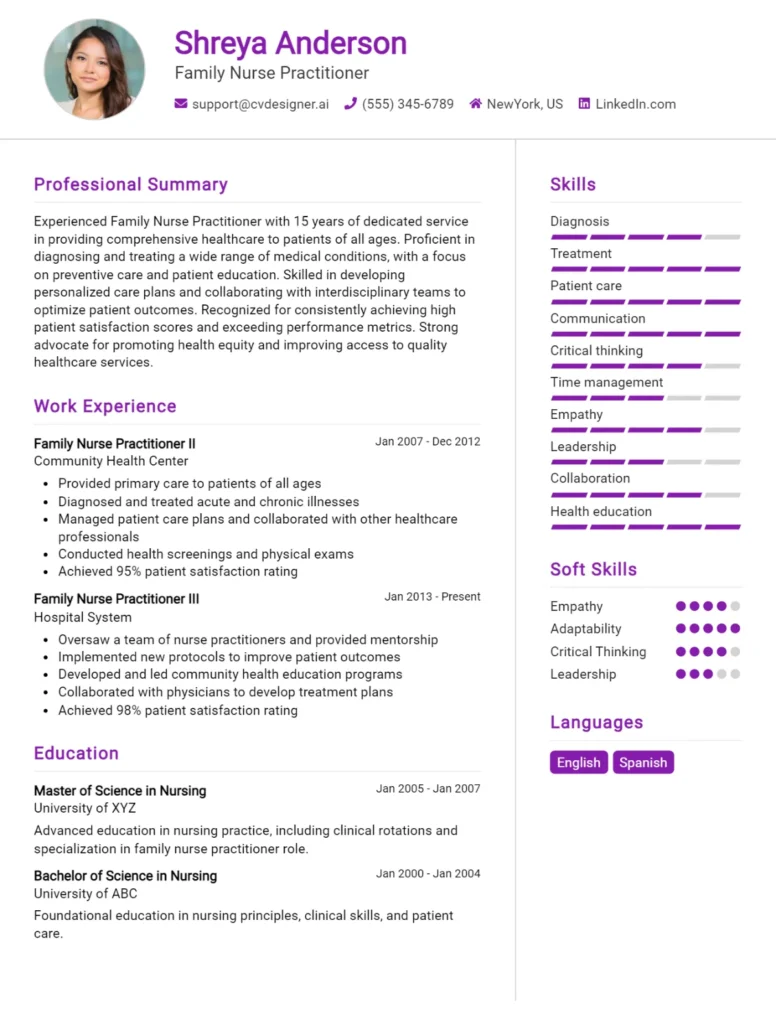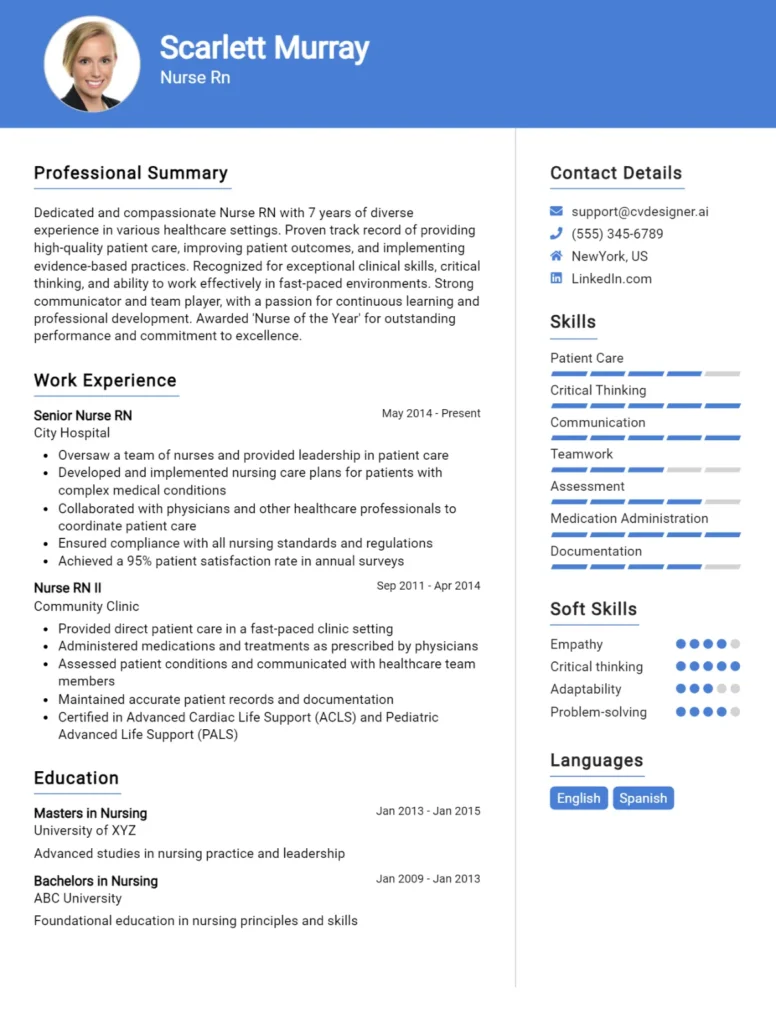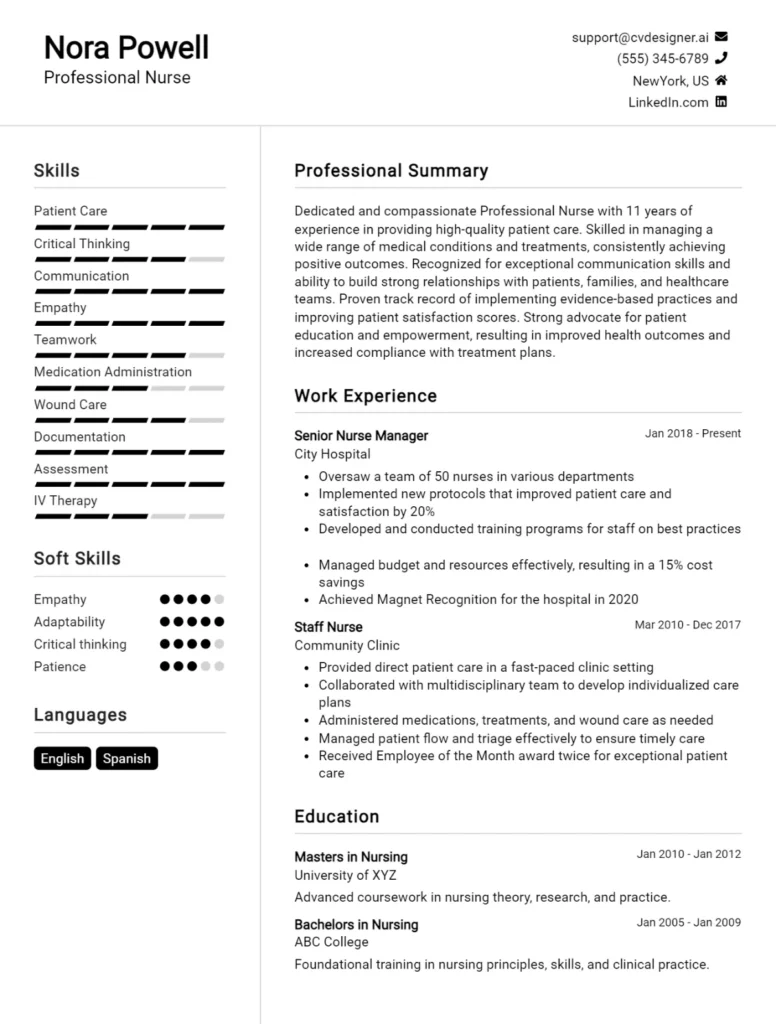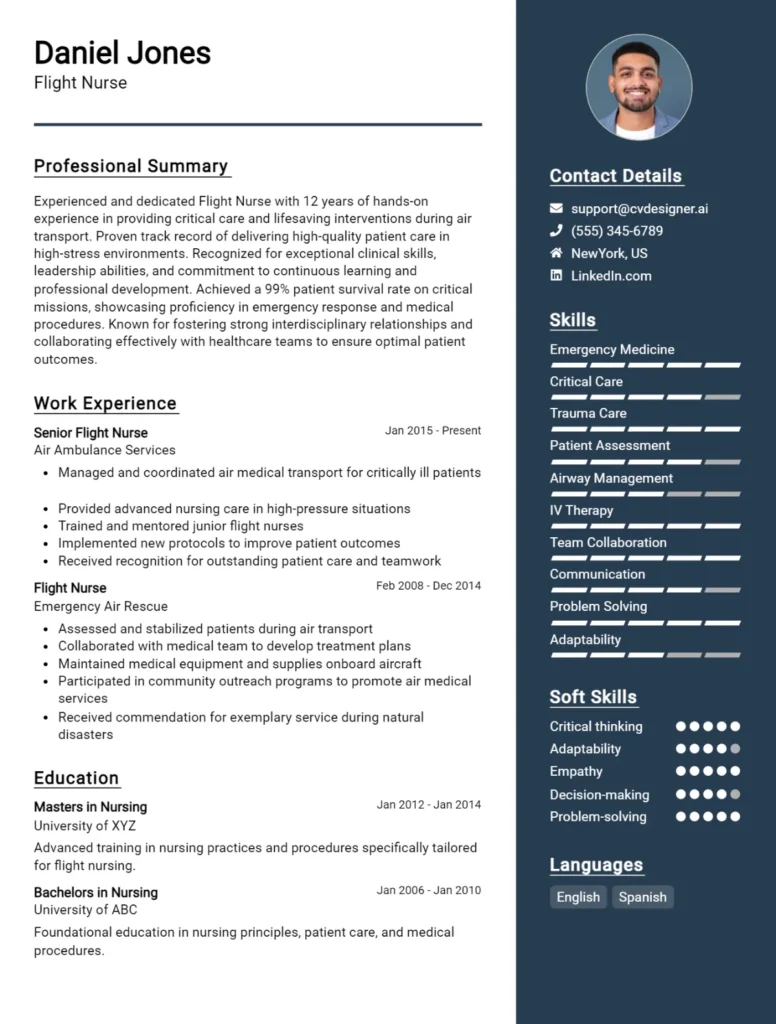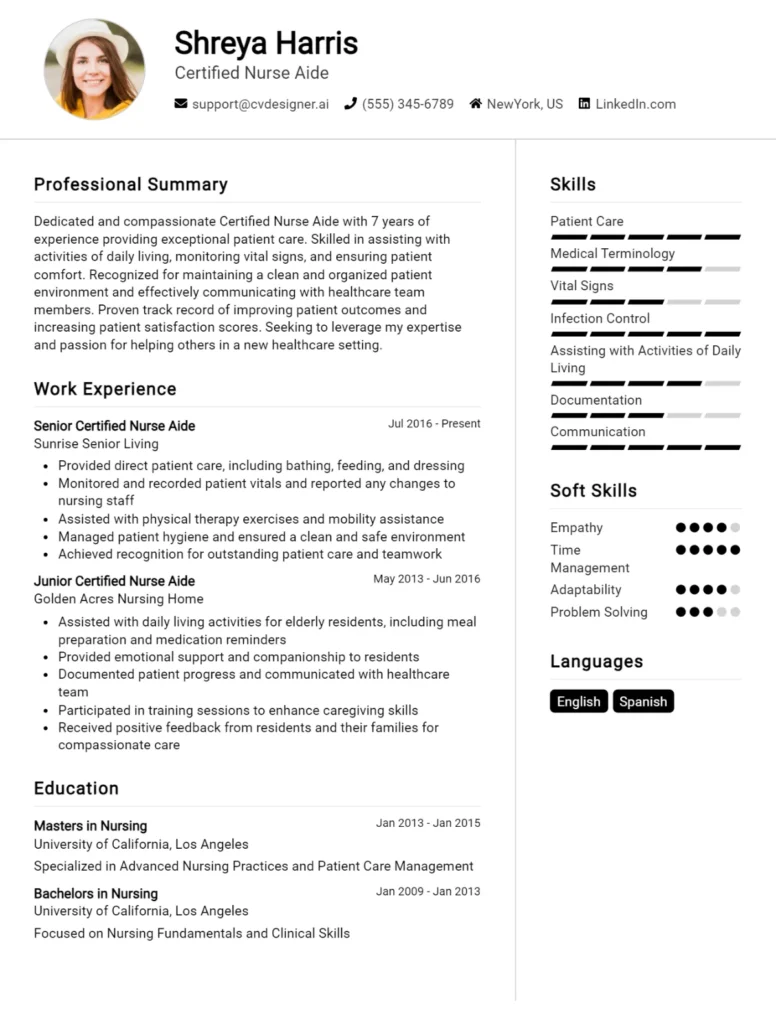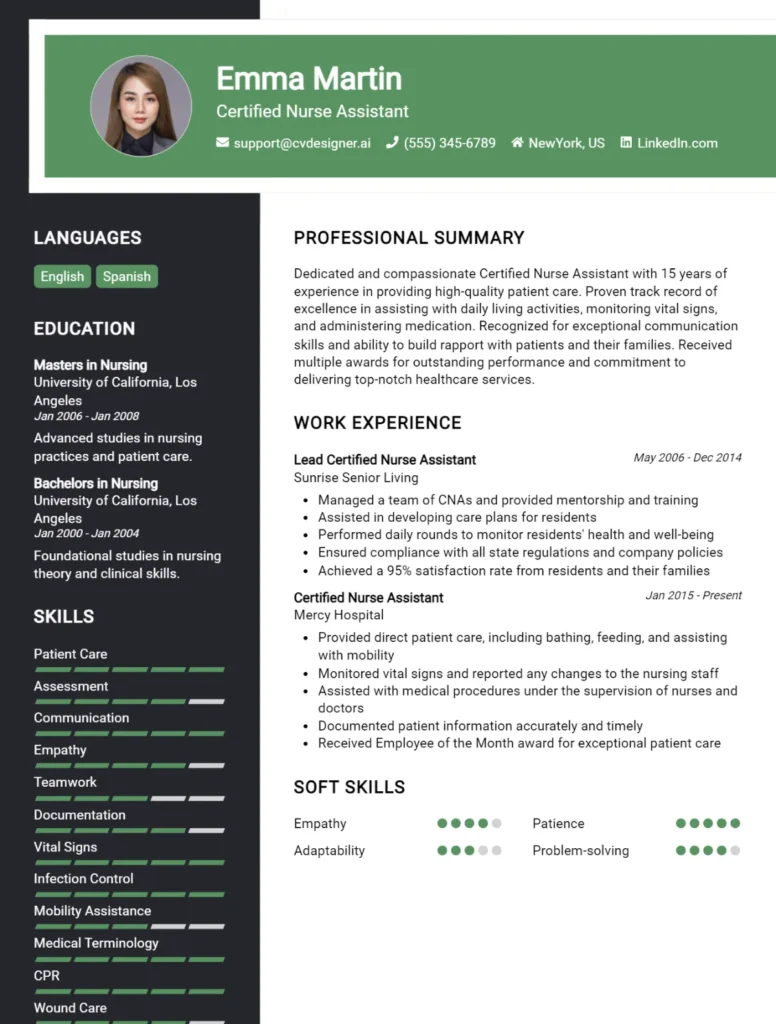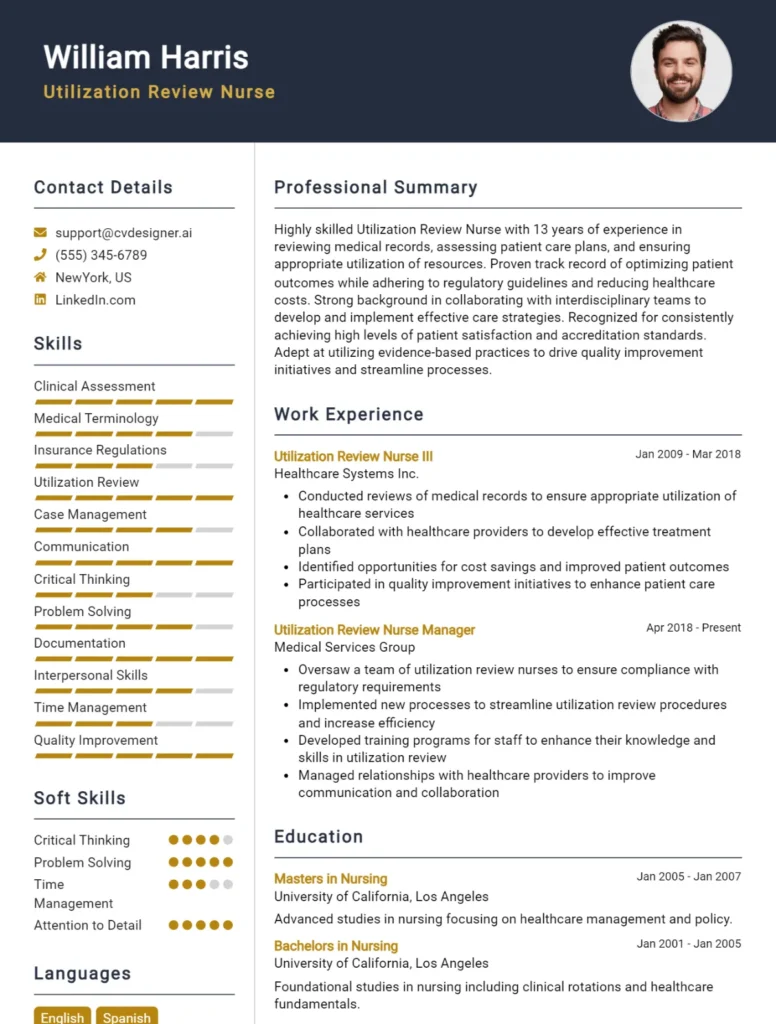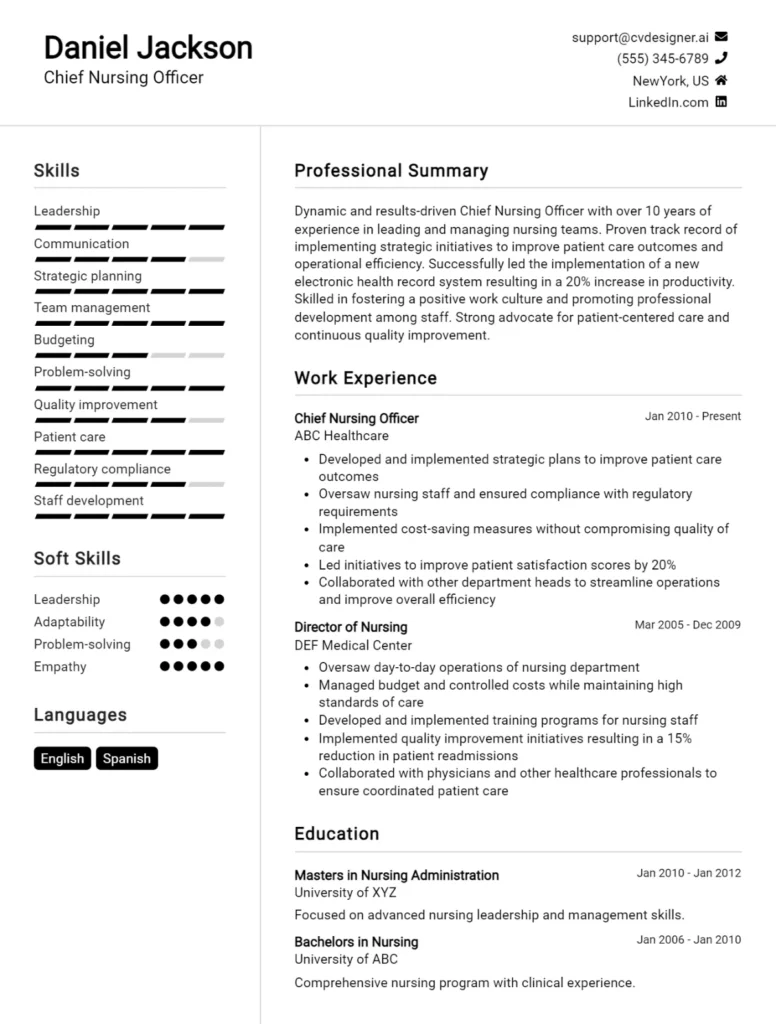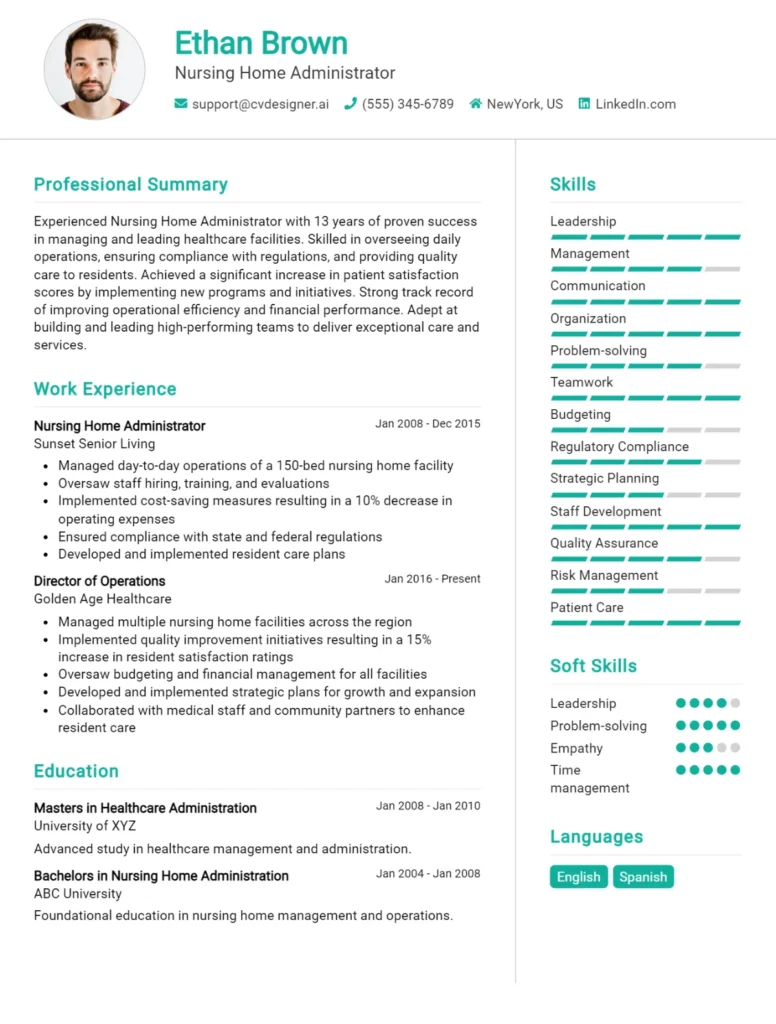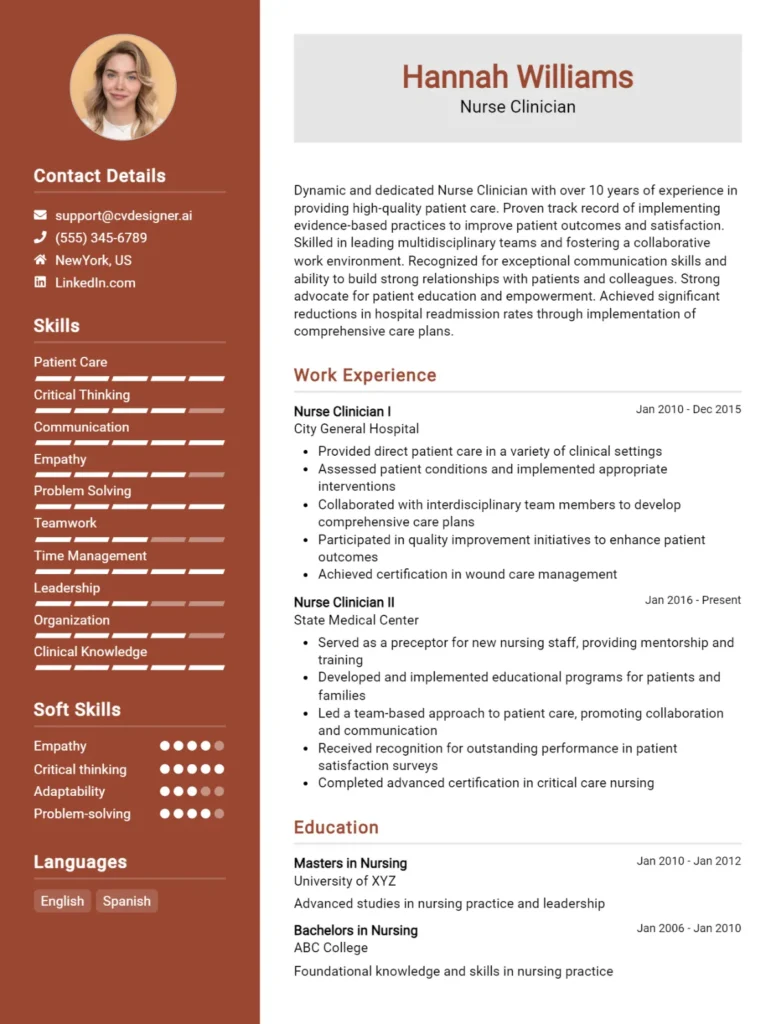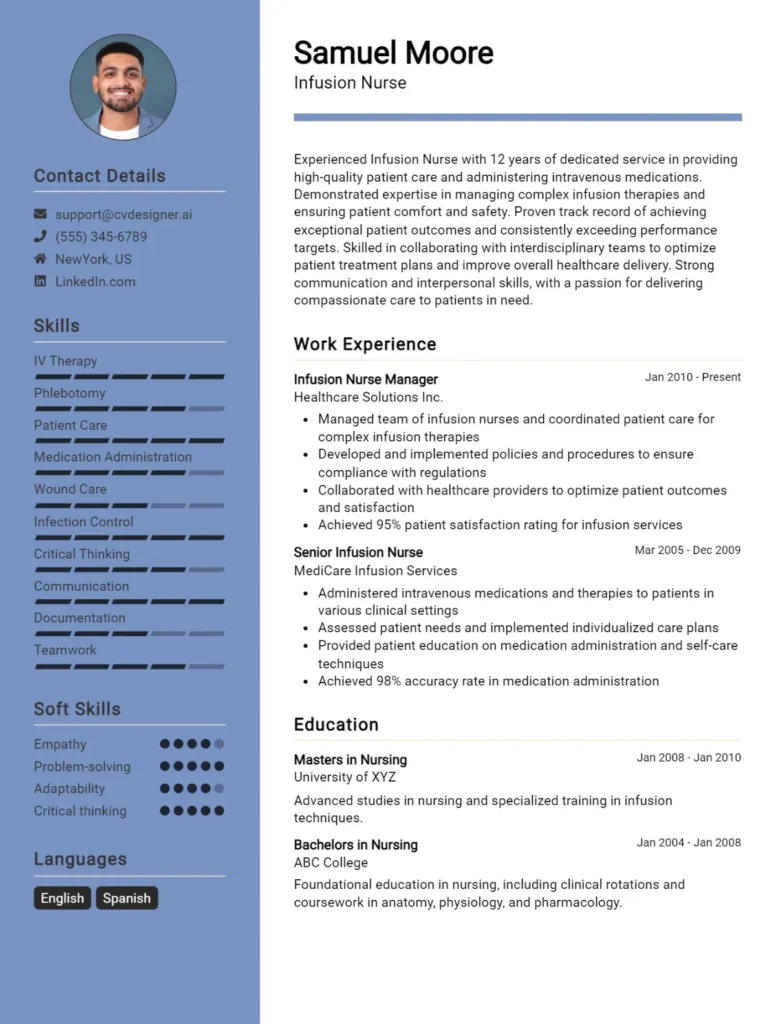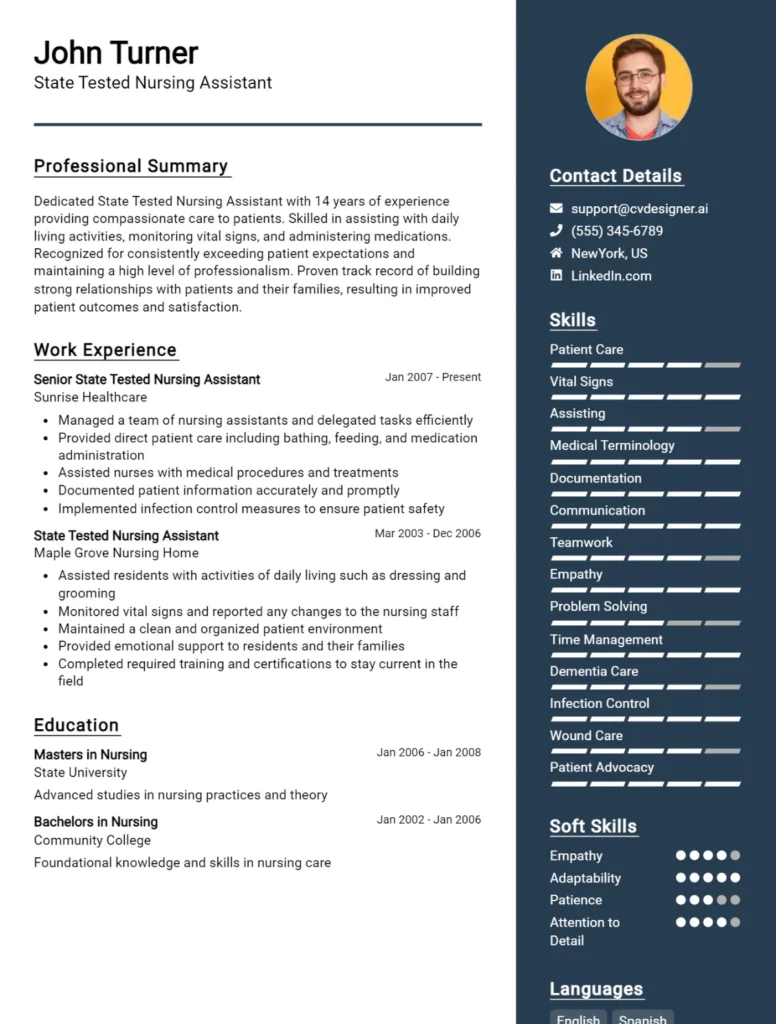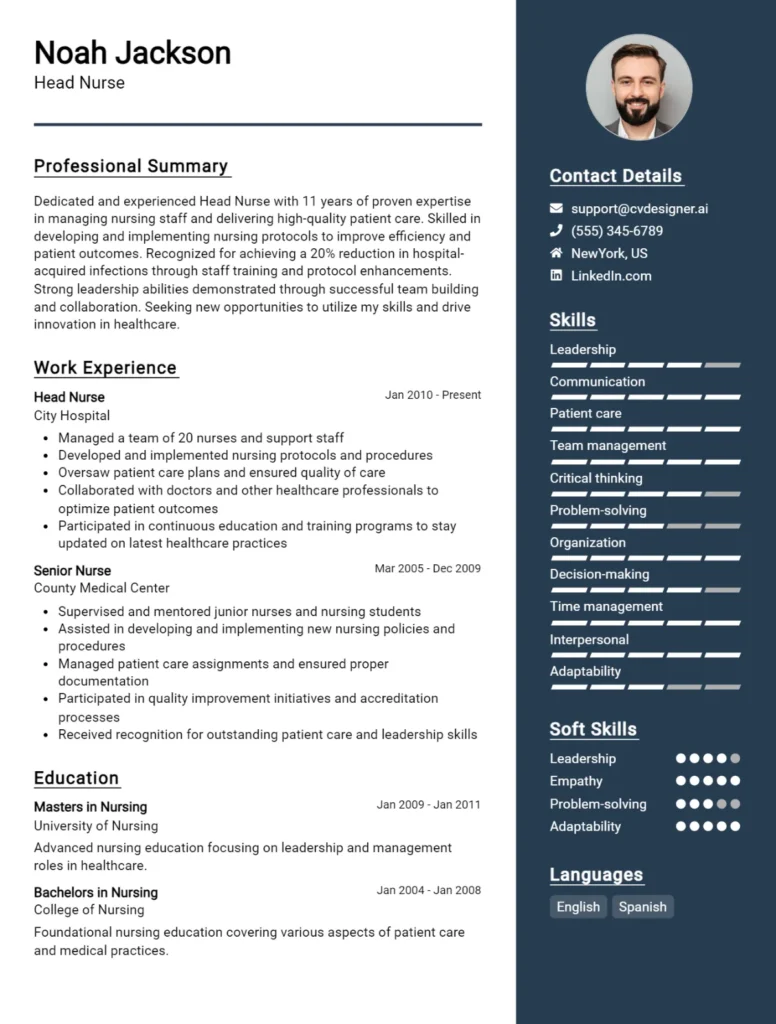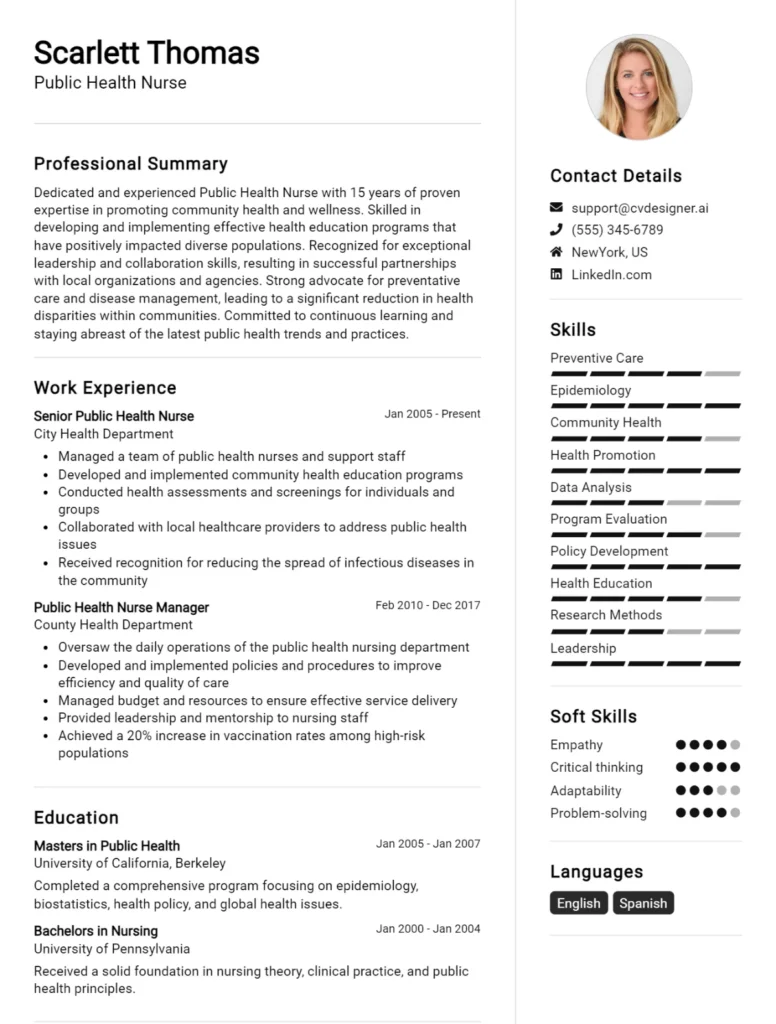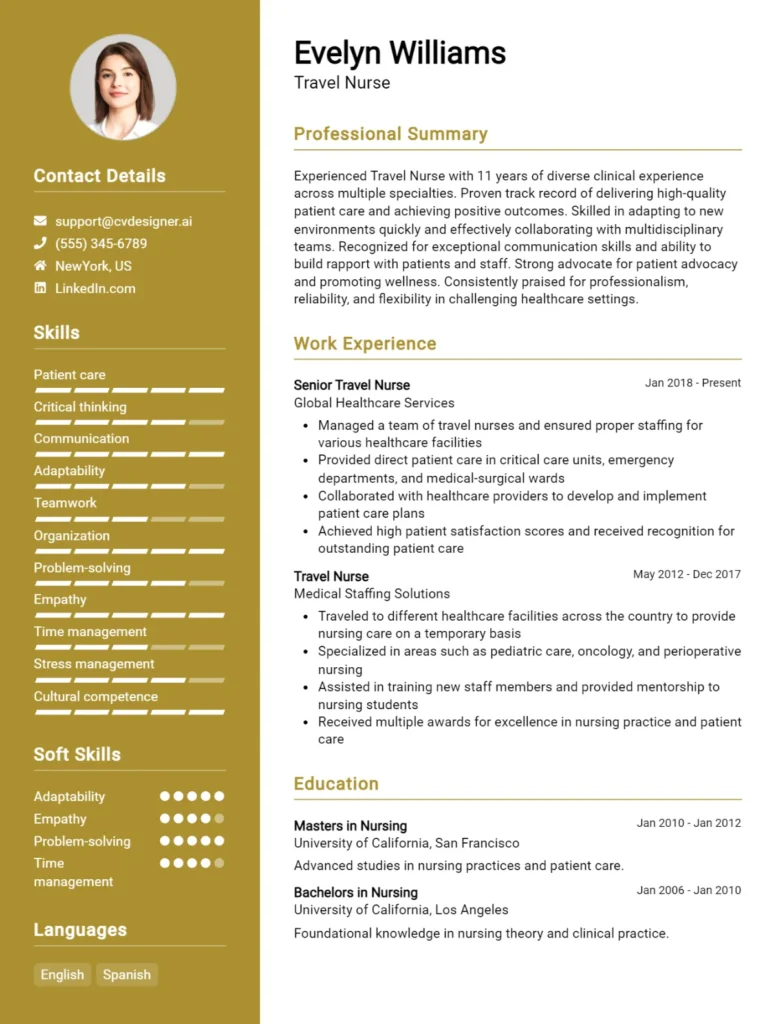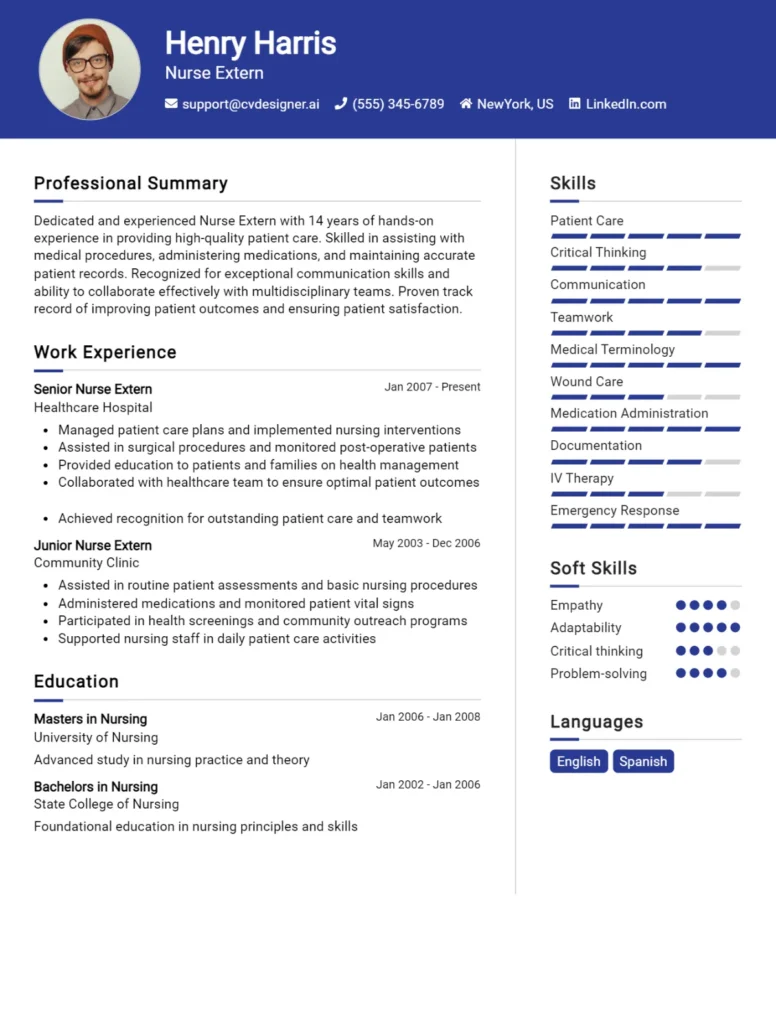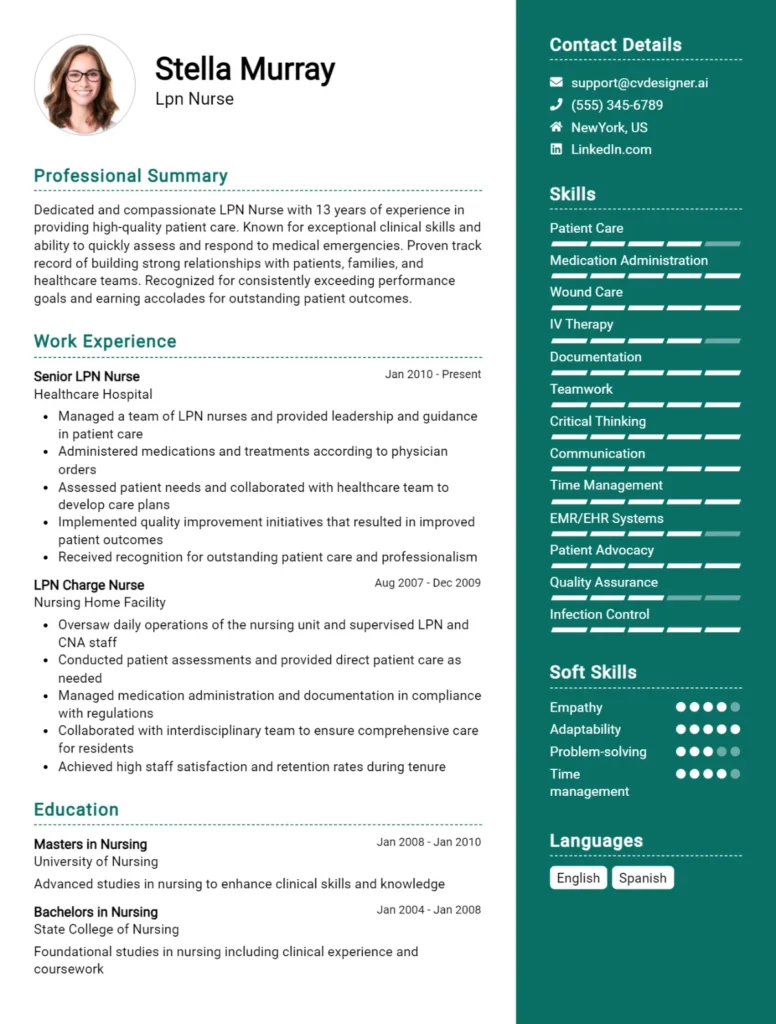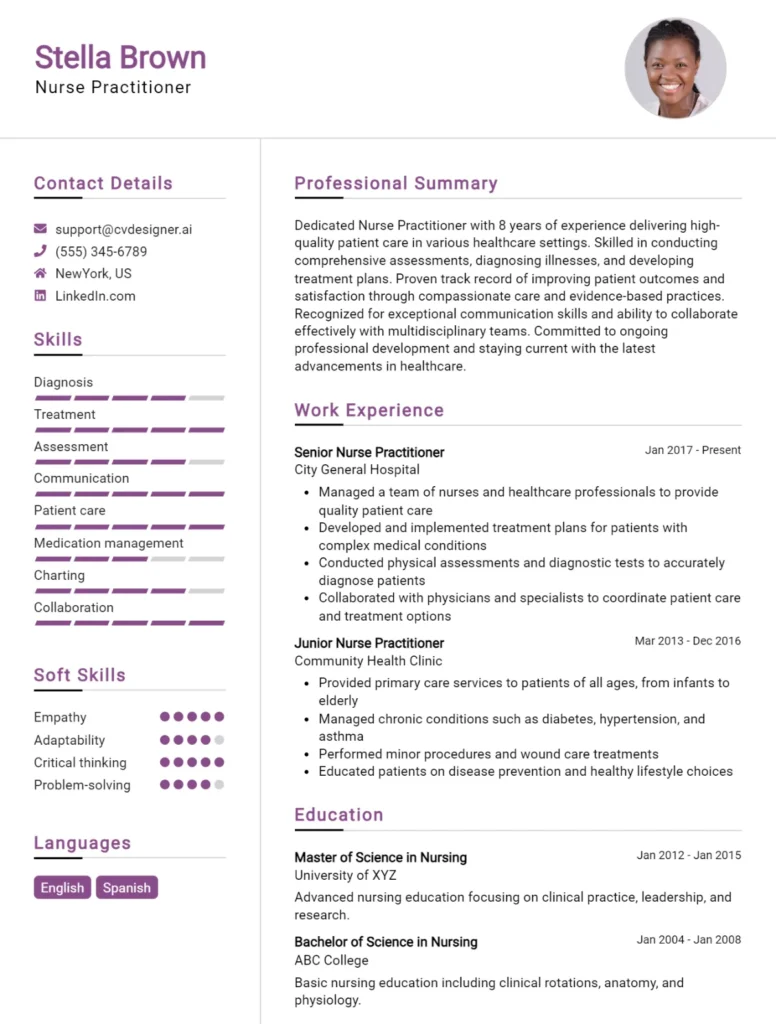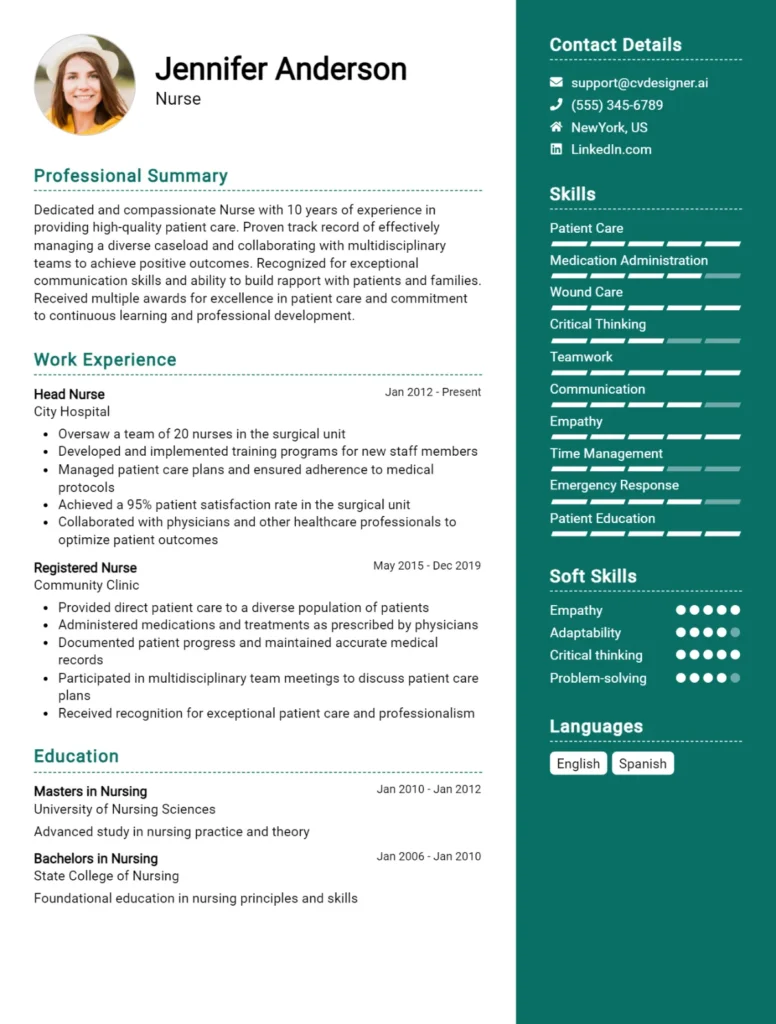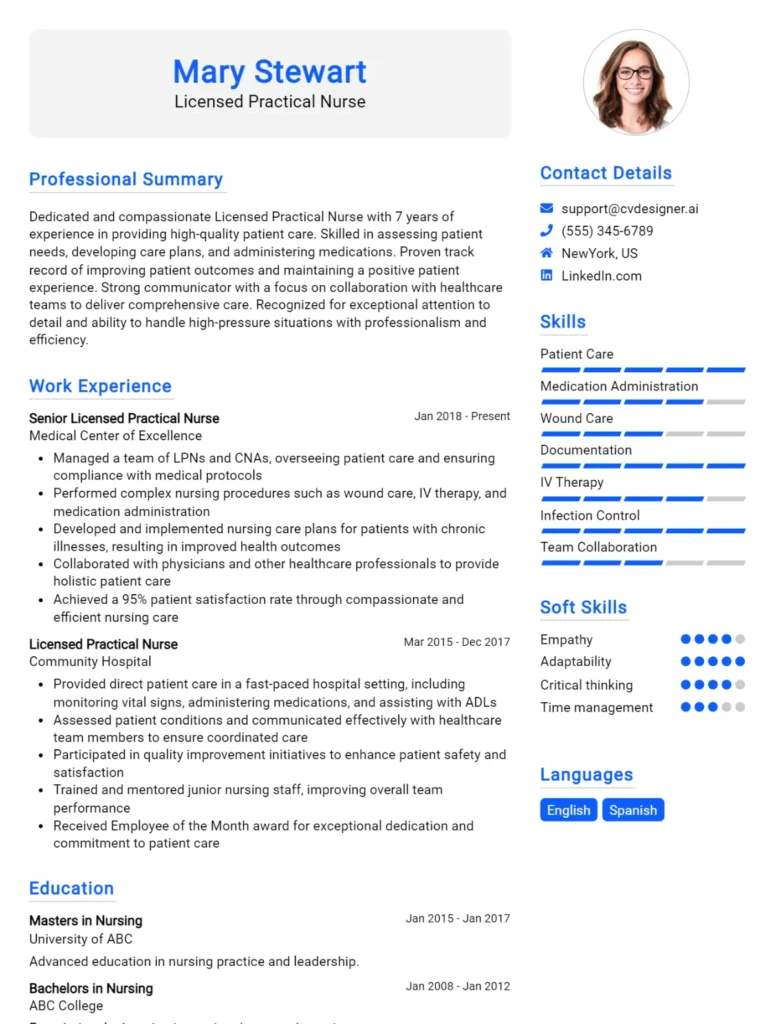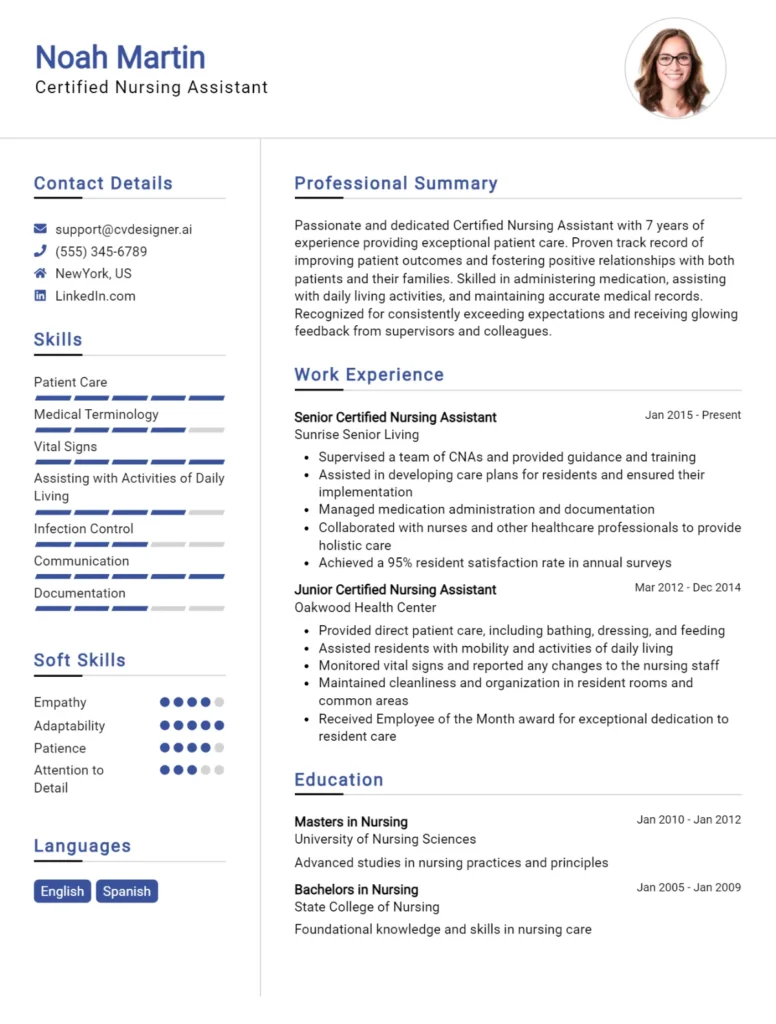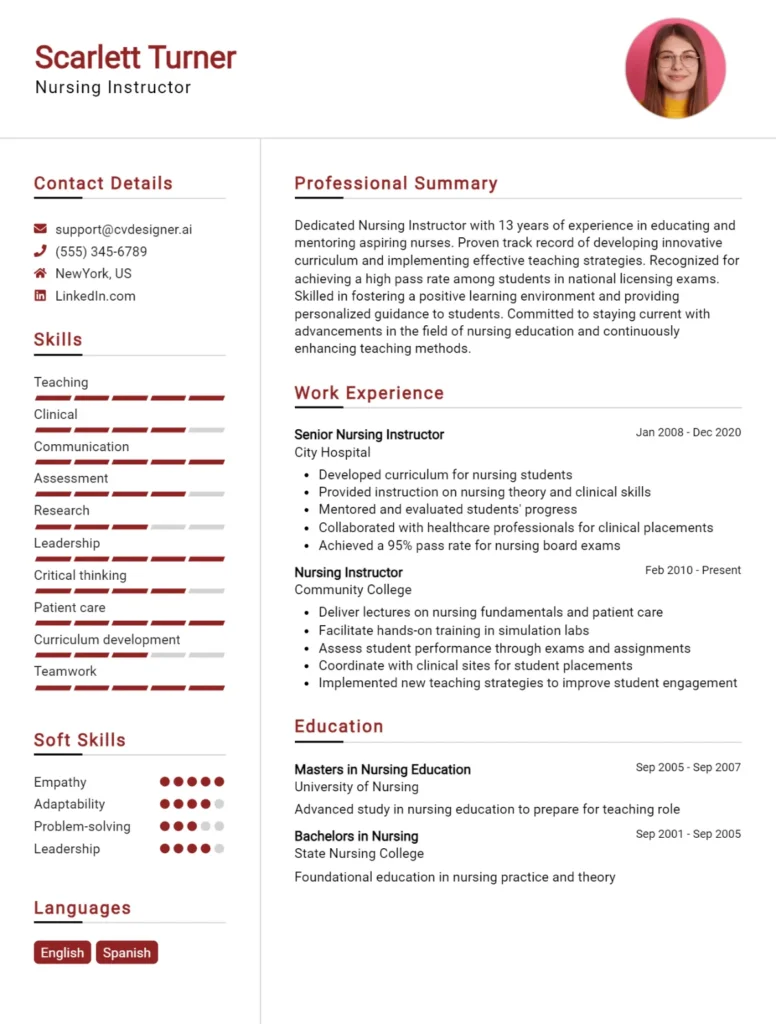Most Popular Registered Nurse CV Examples
Explore additional Registered Nurse CV samples and guides and see what works for your level of experience or role.
As a Registered Nurse, crafting a compelling CV is essential to stand out in a competitive job market. Your CV is not just a document; it's your personal marketing tool that showcases your skills, experience, and dedication to patient care. In this comprehensive guide, we will walk you through the nuances of writing an effective Registered Nurse CV, providing you with insights that can significantly enhance your chances of landing that dream job. Whether you're a seasoned professional or a new graduate, understanding how to present your qualifications can make all the difference. Here’s what you can expect to find in this article:
- Key Components of a Registered Nurse CV: Learn what essential sections to include to create a well-structured document.
- Tailoring Your CV for Specific Roles: Discover how to customize your CV to align with different nursing positions and specialties.
- Highlighting Relevant Skills and Certifications: Understand which skills and certifications are most valuable to potential employers and how to effectively present them.
- Effective Formatting and Design Tips: Get tips on how to format your CV for maximum readability and visual appeal.
- Common Mistakes to Avoid: Identify frequent pitfalls in CV writing that could hinder your job search efforts.
- Sample CV for Reference: Review a practical example of a Registered Nurse CV to guide your writing process.
Dive into this guide to unlock the secrets of crafting a standout Registered Nurse CV that will make a lasting impression on hiring managers!
What is a Registered Nurse CV?
A Registered Nurse (RN) CV is a crucial document that outlines a nurse's professional qualifications, experience, and skills. It serves as a comprehensive summary of the nurse's education, certifications, clinical competencies, and work history, allowing potential employers to assess their suitability for a role. A well-crafted CV not only highlights a nurse's technical abilities but also showcases soft skills such as communication, empathy, and teamwork, which are essential in delivering quality patient care. To create an effective CV, nurses can refer to a cv writing guide that provides valuable tips and insights on structuring and presenting their information.
The importance of a well-designed CV cannot be overstated, as it often serves as the first impression a nurse makes on potential employers. A compelling CV can significantly enhance a nurse's chances of landing an interview and ultimately securing a position in a competitive job market. Utilizing tools like a cv maker can help Registered Nurses create visually appealing and professional documents tailored to specific job opportunities. By investing time and effort into developing a strong CV, nurses can effectively communicate their expertise and commitment to patient care, making them stand out among other candidates.
Key Components of a Registered Nurse CV
- Contact Information: Include your full name, phone number, email address, and LinkedIn profile (if applicable) at the top of your CV.
- Professional Summary: A brief statement summarizing your qualifications, experience, and career objectives as a Registered Nurse.
- Licensure and Certifications: List your nursing license details, including the state of licensure, license number, and expiration date. Include any additional certifications relevant to your nursing practice.
- Education: Detail your nursing degree, including the institution, graduation date, and any honors received.
- Clinical Skills: Highlight specific nursing skills you possess, such as patient assessment, medication administration, and wound care. For more information, visit our article on skills.
- Work Experience: Provide a chronological list of your nursing positions, detailing your responsibilities, achievements, and the healthcare settings in which you worked. For guidance, check out our article on work experience.
- Professional Affiliations: Include memberships in nursing organizations, such as the American Nurses Association (ANA) or specialty nursing associations.
- Continuing Education: Mention any relevant courses, workshops, or seminars you have attended to enhance your nursing practice.
- Volunteer Experience: Highlight any volunteer work in healthcare settings that demonstrates your commitment to patient care and community service.
- Awards and Honors: List any recognitions you have received for your work as a nurse, including awards from institutions or professional organizations.
- References: Provide a statement indicating that references are available upon request, or include them if specifically required by the employer.
- Additional Information: Include any relevant personal attributes, languages spoken, or technology proficiencies that may enhance your candidacy.
Sample Registered Nurse CV for Inspiration
[Your Name]
[Your Address]
[City, State, Zip Code]
[Your Email Address]
[Your Phone Number]
[LinkedIn Profile or Personal Website]
Professional Summary
Compassionate and dedicated Registered Nurse with over 5 years of experience in delivering high-quality patient care in diverse medical settings. Demonstrated ability to assess patient needs, develop individualized care plans, and provide education and support to patients and their families. Proficient in implementing evidence-based practices and maintaining compliance with healthcare regulations. Strong interpersonal skills and a commitment to fostering a positive health environment.
Work Experience
Registered Nurse
Saint Mary’s Hospital, Anytown, State
June 2020 – Present
- Provide comprehensive nursing care to a diverse patient population in a 250-bed acute care facility.
- Collaborate with multidisciplinary teams to develop and implement individualized care plans based on patient assessments.
- Administer medications, monitor vital signs, and perform diagnostic tests in accordance with established protocols.
- Educate patients and families on disease management, medication adherence, and preventive health measures.
- Actively participate in quality improvement initiatives, enhancing patient outcomes and satisfaction scores.
Registered Nurse (Med-Surg Unit)
City General Hospital, Anytown, State
January 2018 – May 2020
- Delivered patient-centered care to post-operative and medical-surgical patients in a fast-paced environment.
- Conducted thorough assessments and prioritized care based on patient acuity and needs.
- Maintained accurate medical records and documentation in compliance with legal and ethical standards.
- Assisted in training and mentoring new nursing staff, fostering a collaborative team environment.
- Engaged in patient education initiatives, resulting in a 15% increase in patient understanding of discharge instructions.
Nursing Intern
Anytown Community Clinic, Anytown, State
May 2017 – December 2017
- Assisted nursing staff in providing care to patients in an outpatient clinic setting.
- Gained experience in triaging patients, performing vital sign checks, and assisting with minor procedures.
- Supported patient education efforts by providing information about treatment plans and health management.
- Developed strong relationships with patients and families, ensuring a comfortable and empathetic care experience.
Education
Bachelor of Science in Nursing (BSN)
University of Anytown, Anytown, State
Graduated: May 2017
Associate Degree in Nursing (ADN)
Anytown Community College, Anytown, State
Graduated: May 2015
Skills
- Patient Assessment and Care Planning
- Medication Administration and Management
- Patient and Family Education
- Electronic Health Records (EHR) Proficiency
- Strong Communication and Interpersonal Skills
- Team Collaboration and Leadership
- Critical Thinking and Problem Solving
- Time Management and Organizational Skills
Certifications
- Registered Nurse (RN), State Board of Nursing
- Basic Life Support (BLS)
- Advanced Cardiovascular Life Support (ACLS)
- Pediatric Advanced Life Support (PALS)
Publications
- Smith, J. (2022). “Holistic Approaches to Patient Care: Integrating Mind, Body, and Spirit.” Journal of Nursing Practice, 45(3), 150-155.
- Smith, J. & Doe, A. (2021). “Improving Patient Outcomes through Effective Communication.” Nursing Today, 12(1), 22-26.
Professional Affiliations
- American Nurses Association (ANA)
- National Student Nurses' Association (NSNA)
- Sigma Theta Tau International Honor Society of Nursing
Registered Nurse CV Writing Tips
When crafting a CV as a Registered Nurse, it's essential to present a clear and concise overview of your qualifications, experiences, and skills tailored to the specific role you are applying for. Start with a professional summary that highlights your nursing background, key areas of expertise, and career aspirations. Use bullet points to list your work experience and accomplishments, emphasizing your clinical skills, patient care abilities, and any relevant certifications. Ensure that your CV is well-organized, easy to read, and free of grammatical errors, as attention to detail is crucial in the nursing profession.
- Tailor your CV for each job application by emphasizing the most relevant skills and experiences.
- Include a strong professional summary that encapsulates your nursing philosophy and career goals.
- Use bullet points for job descriptions to enhance readability and highlight key achievements.
- Quantify your accomplishments with specific metrics, such as patient satisfaction scores or the number of patients cared for.
- List any certifications, licenses, and relevant continuing education courses prominently.
- Highlight any specialized skills, such as proficiency in specific medical software, languages, or advanced nursing techniques.
- Ensure your contact information is current and easy to find at the top of your CV.
- Keep your CV to one or two pages, focusing on the most pertinent information to maintain the reader's interest.
Registered Nurse CV Summary Examples
As a Registered Nurse, your CV summary is a critical component that highlights your skills, experience, and professional philosophy. Below are several examples of effective CV summaries that can help you stand out in your job application.
Compassionate and dedicated Registered Nurse with over 5 years of experience in fast-paced hospital settings. Proficient in providing high-quality patient care and collaborating with multidisciplinary teams to improve patient outcomes. Strong advocate for patient education and safety, committed to continuous professional development.
Detail-oriented Registered Nurse with a solid background in critical care and emergency medicine. Experienced in managing complex patient cases, performing advanced procedures, and responding swiftly in high-pressure situations. Passionate about enhancing patient experiences and fostering a supportive healthcare environment.
Skilled Registered Nurse with 3 years of experience in pediatrics, providing empathetic and effective care to children and their families. Adept at developing individualized care plans and ensuring adherence to safety protocols. A team player who thrives in collaborative environments and is dedicated to lifelong learning.
Dynamic Registered Nurse specializing in geriatric care, with expertise in managing chronic diseases and improving patients' quality of life. Strong communicator with a talent for building trusting relationships with patients and their families. Dedicated to advocating for elderly patients' needs and ensuring comprehensive care.
Motivated Registered Nurse with a focus on mental health, equipped with experience in crisis intervention and therapeutic communication. Committed to promoting mental wellness and providing compassionate care to individuals in need. Strong background in patient assessments and treatment planning in both inpatient and outpatient settings.
Build a Strong Experience Section for Your Registered Nurse CV
As a Registered Nurse, showcasing your work experience effectively on your CV is crucial in demonstrating your clinical skills, patient care abilities, and teamwork. Here are some strong examples of work experience descriptions that highlight your qualifications and contributions to patient care:
- Provided comprehensive nursing care to a diverse patient population in a busy medical-surgical unit, managing up to 10 patients per shift while ensuring adherence to best practices and safety protocols.
- Administered medications and treatments as prescribed, closely monitoring patients for any adverse reactions and maintaining accurate documentation in electronic health records.
- Collaborated with multidisciplinary teams to develop and implement individualized care plans, enhancing patient outcomes and promoting a holistic approach to healthcare.
- Educated patients and families on disease management, medication administration, and post-discharge care, resulting in a 20% reduction in readmission rates.
- Assisted in emergency situations, utilizing advanced life support techniques and rapid assessment skills to stabilize critically ill patients in the emergency department.
- Conducted patient assessments and triaged cases based on severity, ensuring timely interventions and optimal care delivery in a fast-paced clinical environment.
- Mentored and trained new nursing staff, fostering a culture of continuous learning and improving team efficiency through hands-on guidance and support.
- Participated in quality improvement initiatives, analyzing patient care data to identify areas for enhancement and implementing evidence-based practices that improved patient satisfaction scores by 15%.
Registered Nurse CV Education Examples
As a Registered Nurse, a solid educational background is crucial for providing high-quality patient care and meeting the demands of the healthcare industry. Educational qualifications not only equip nurses with essential clinical skills but also enhance their critical thinking, communication, and leadership abilities. Below are examples of educational backgrounds that are relevant to a Registered Nurse.
- Bachelor of Science in Nursing (BSN)
A BSN program typically covers advanced nursing concepts, patient care, and healthcare systems. Graduates are prepared for various clinical roles and leadership positions within healthcare settings. - Associate Degree in Nursing (ADN)
An ADN program focuses on the fundamental skills required for nursing practice. This two-year degree allows graduates to sit for the NCLEX-RN examination and enter the nursing workforce quickly. - Master of Science in Nursing (MSN)
An MSN degree offers advanced education in specialized areas of nursing, such as nurse practitioner, clinical nurse specialist, or nurse educator. This degree enhances leadership skills and clinical expertise. - Diploma in Nursing
Nursing diplomas, often offered by hospitals, provide hands-on training and clinical experience. While less common today, they still serve as a pathway to becoming a Registered Nurse. - Continuing Education Courses
Registered Nurses often pursue continuing education courses to stay current with medical advancements, enhance their skills, and meet licensure requirements. These courses can cover various topics such as patient safety, nursing ethics, and specialized training in fields like oncology or pediatrics.
Skills to Highlight in Your Registered Nurse CV
As a Registered Nurse, showcasing a blend of soft and hard skills on your CV is essential to highlight your qualifications and suitability for the role. Soft skills emphasize your interpersonal abilities and emotional intelligence, while hard skills reflect your technical expertise and clinical knowledge. Here’s a list of both skill types to consider when crafting your Registered Nurse CV.
Soft Skills:
- Empathy - Ability to understand and share the feelings of patients.
- Communication - Effective verbal and written communication with patients and healthcare teams.
- Teamwork - Collaborating with colleagues to provide comprehensive patient care.
- Adaptability - Flexibility to adjust to changing situations and patient needs.
- Critical Thinking - Analyzing information to make informed decisions quickly.
- Time Management - Prioritizing tasks efficiently in a fast-paced environment.
- Problem Solving - Identifying issues and developing appropriate solutions.
- Patience - Maintaining composure and understanding in high-stress situations.
- Compassion - Providing care with kindness and sensitivity.
- Attention to Detail - Ensuring accuracy in patient assessments and documentation.
Hard Skills:
- Patient Assessment - Proficient in performing comprehensive physical examinations.
- Medication Administration - Knowledgeable in safely administering medications and monitoring effects.
- Wound Care - Skilled in treating and managing various types of wounds and injuries.
- IV Therapy - Experienced in intravenous therapy techniques and management.
- Electronic Health Records (EHR) - Proficient in using EHR systems for documentation and patient management.
- Basic Life Support (BLS) - Certified in BLS and CPR techniques for emergency situations.
- Infection Control - Understanding of protocols to prevent and manage infections.
- Health Education - Ability to educate patients and families about health conditions and treatments.
- Vital Signs Monitoring - Skilled in accurately measuring and interpreting vital signs.
- Clinical Procedures - Competent in performing various clinical procedures, such as catheterization and blood draws.
Registered Nurse CV Format
As a Registered Nurse, creating a well-structured CV is essential to showcase your skills and experiences effectively. The right format can vary based on your level of experience, whether you're a new graduate, an experienced nurse, or seeking a specialized position. Utilizing a clear and professional layout will help you stand out to potential employers.
For different job levels, here are the best formats to consider:
- Entry-Level Nurses: A chronological format is ideal, emphasizing education and clinical rotations. Focus on relevant coursework and internships.
- Experienced Nurses: A combination format works well, highlighting both skills and work history. Include specific achievements and responsibilities in previous roles.
- Specialized Nurses: A functional format can be beneficial, allowing you to showcase specific skills and certifications related to your specialty.
- Nurse Managers: An executive CV format is recommended, focusing on leadership experience, strategic initiatives, and team management.
- Travel Nurses: A concise format that lists assignments and locations can help demonstrate adaptability and diverse experience in various healthcare settings.
For additional insights on creating an effective CV, check out this cv format guide.
Common Mistakes to Avoid in a Registered Nurse CV
Creating a compelling CV is crucial for Registered Nurses aiming to stand out in a competitive job market. A well-crafted CV not only showcases your qualifications and experience but also reflects your professionalism and attention to detail. However, many nurses make common mistakes that can hinder their chances of landing their desired position. To help you present the best version of yourself, here are several pitfalls to avoid when crafting your CV:
- Neglecting to Tailor the CV: Using a generic CV for all applications rather than customizing it for each specific job can lead to missed opportunities.
- Overloading with Jargon: While medical terminology is essential, overusing jargon can confuse hiring managers who may not be familiar with specific terms.
- Lack of Specific Achievements: Failing to highlight specific accomplishments and quantifiable results can make your CV less impactful.
- Inconsistent Formatting: Using different fonts, sizes, or styles throughout the CV can create a disorganized appearance and distract from the content.
- Omitting Essential Certifications: Not including relevant certifications or licenses, such as your RN license, can leave employers questioning your qualifications.
- Including Irrelevant Information: Listing unrelated work experience or skills can dilute the focus on your nursing expertise and qualifications.
- Typos and Grammatical Errors: Simple mistakes can undermine your professionalism and attention to detail, so thorough proofreading is essential.
- Using Passive Language: Opting for passive voice instead of active language can weaken the impact of your statements and achievements.
- Ignoring the Importance of Keywords: Not incorporating industry-specific keywords can make it harder for your CV to pass through Applicant Tracking Systems (ATS).
- Failing to Update Regularly: Not keeping your CV current with new experiences, skills, and certifications can lead to missed opportunities and inaccuracies.
Key Takeaways for a Registered Nurse CV
- Start with a professional summary that highlights your experience, skills, and career goals as a Registered Nurse.
- List your nursing qualifications prominently, including your degree, certifications, and any specialized training.
- Emphasize your clinical experience, detailing the types of settings you’ve worked in (e.g., hospitals, clinics, long-term care) and the specific populations you’ve served.
- Include a skills section that showcases both soft skills (e.g., communication, empathy) and hard skills (e.g., IV therapy, patient assessment).
- Quantify your achievements where possible, using metrics to illustrate your impact (e.g., reduced patient wait times by X%, managed a caseload of X patients).
- Tailor your CV for each job application by incorporating relevant keywords from the job description.
- Highlight your ability to work in a team, as collaboration is key in healthcare settings.
- Consider using CV templates to enhance the visual appeal of your document. Explore various cv templates to find one that suits your style.
- Don’t forget to include continuing education or professional development courses that demonstrate your commitment to staying current in the field.
- Add any professional affiliations or memberships in nursing organizations that can strengthen your CV.
- Include a section for references, either as “Available upon request” or listing them if space allows.
- After finalizing your CV, consider creating a tailored cover letter using our cover letter templates to complement your application. For a more streamlined process, try our cv builder to create a polished CV quickly.
Build your CV in minutes
Use an AI-powered cv builder and have your cv done in 5 minutes. Just select your template and our software will guide you through the process.
